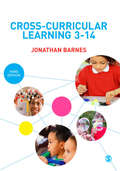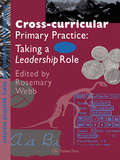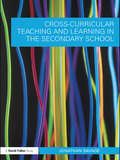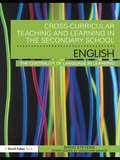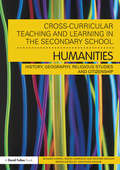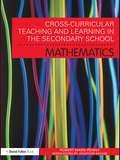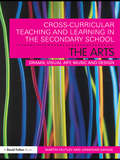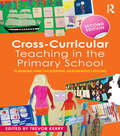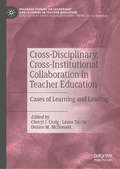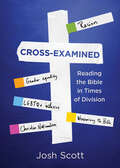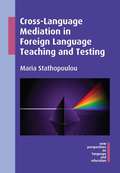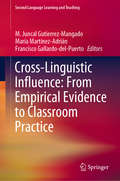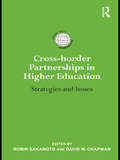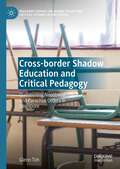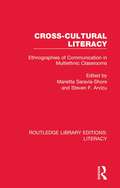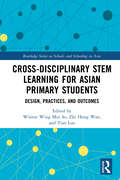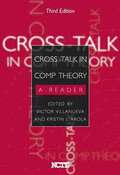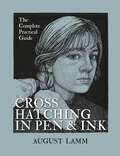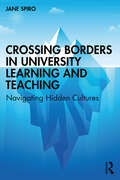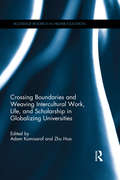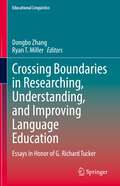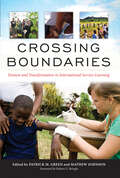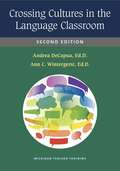- Table View
- List View
Cross-Curricular Learning 3-14
by Jonathan BarnesThis third edition explores the key practical and theoretical issues underpinning cross-curricular teaching and learning across the early years, primary education and lower secondary school. Combining findings from research and educational theory with examples of thought-provoking teaching in schools, this textbook discusses how high quality teaching across different curriculum areas can be planned, taught, assessed and used to encourage creative and deep learning experiences. Revised and updated to reflect current curriculum policy and contemporary research, this third edition includes: · Coverage of the 2014 National Curriculum in England and the implications for cross-curricular practice · More case studies from across the curriculum, from different age groups and exploring different aspects of teaching · Improved coverage of cross-curricular practice in the Early Years Foundation Stage.
Cross-Curricular Primary Practice: Taking a Leadership Role
by Rosemary WebbThis text discusses the theory and practice of several important areas of cross-curricular work in primary schools. It uses the National Curriculum Council's categories of themes, skills and dimensions to examine what is involved in such practice and to consider its current status in schools and future possibilities.; Providing practical suggestions for more well- established areas such as environmental studies, it also examines topical but under-represented themes, skills and dimensions such as media education, pupil self-assessment and discipline. The authors argue that cross-curricular practice both contributes to National Curriculum requirements and gives these requirements overall coherence. Cross- curricular practice also enables children to develop the knowledge, skills and concepts that are of value in coping with, and enjoying, the complexities of the 21st century. Suggestions are provided on how to provide leadership and stimulate staff interest in these areas by reviewing existing policies, teaching and resources.
Cross-Curricular Teaching and Learning in the Secondary School
by Jonathan SavageWhat is the role of the individual school 'subject' and 'subject teacher' within school? Is it to teach a set of core subject knowledge, skills and understanding in way that remains faithful to long-standing subject cultures and pedagogies? Or is there another way to consider how the curriculum, and the notion of individual subjects and teachers' pedagogy, could be constructed. Working from the key principle that there is no curriculum development without teacher development, Cross-Curricular Teaching and Learning in the Secondary School argues for a new, skilful pedagogy which embeds an authentic, cross-curricular approach to teaching and learning in the work of the individual teacher. This approach respects and builds on individual subject cultures, embracing and exploring links between subject knowledge and subject pedagogies in an enriching way. Drawing on examples and case studies taken from innovative practices in different schools and subject areas, as well as summarising lessons from key pieces of research evidence this book includes: Clear theoretical frameworks for cross-curricular processes of teaching and learning A lively account of key issues blended with engaging stories of current practice An analysis of the use of language, ICT and assessment as key components of a skilful pedagogical practice that affects how teaching is delivered and how pupils learn in cross-curricular contexts Practical tasks and questions for reflective practice This timely textbook is essential reading for all students on Initial Teacher Training courses and PGCE courses as well as practising teachers looking to holistically introduce cross-curricular themes and practices in their own subjects.
Cross-Curricular Teaching and Learning in the Secondary School ... English: The Centrality of Language in Learning
by David StevensWhat is the role of the individual school 'subject' and 'subject teacher' within school? Is it to teach a set of core subject knowledge, skills and understanding in a way that remains faithful to long-standing subject cultures and pedagogies? Or is there another way to consider how the curriculum and the notion of individual subjects and teachers' pedagogy could be constructed? Cross-Curricular Teaching and Learning in the Secondary School ... English brings together ongoing debates about personalised learning, creativity and ICT in education to establish a clear theoretical framework for cross-curricular teaching and learning in English and literacy. Presenting an appropriate pedagogy for cross-curricular teaching that draws on this framework, it promotes radical new approaches to English teaching as part of a widened curriculum through practical examples and theoretical discussions, blended with engaging stories of current practice. With links to other curriculum subjects and current education policy, features include: theoretical examination of key issues; assessment of the strengths and weaknesses of different curricular models; clear principles for effective assessment; a wide range of case studies; summaries of key research linked to suggestions for further reading; professional development activities to promote cross-curricular dialogue. Part of the Cross-Curricular Teaching and Learning in the Secondary School series, this timely, interdisciplinary textbook is essential reading for all students on Initial Teacher Training courses and practising teachers looking to holistically introduce cross-curricular themes and practices in secondary English teaching.
Cross-Curricular Teaching and Learning in the Secondary School... Humanities: History, Geography, Religious Studies and Citizenship
by Simon Harrison Richard Harris Richard McFahnWhat is the role of the humanities in the modern school? Should geography, history, RE and Citizenship teachers remain faithful to long-standing subject cultures and pedagogies? Or is there another way to consider how the curriculum, and the notion of individual subjects and teachers’ pedagogy, could be constructed? Drawing on case studies taken from a range of innovative secondary schools, and interrogating the use of cross-curricular approaches in UK schools, Cross-Curricular Teaching and Learning in Humanities constructs a research based pedagogy with practical steps for students and teachers as they consider how cross-curricular approaches can be implemented in their own subject areas. Key features include: Clear theoretical frameworks for cross-curricular processes of teaching and learning in the humanities Lively and engaging text that blends key issues with stories of current practice An analysis of the use of assessment, enquiry, and pupil talk as key components in building a cross-curricular approach to the humanities Practical and reflective tasks that enable to reader to apply their reading to day to day practice, alongside links to professional standards Summaries of key research linked to suggestions for further reading Professional development activities to promote cross-curricular dialogue Part of the Cross-Curricular Teaching and Learning in the Secondary School series, this timely interdisciplinary textbook is essential reading for all students on Initial Teacher Training courses and practising teachers looking to holistically introduce cross-curricular themes and practices in secondary Humanities teaching.
Cross-Curricular Teaching and Learning in the Secondary School... Mathematics
by Robert Ward-PennyWhy is cross-curricular work so valuable in the mathematics classroom?Why can pupils sometimes draw graphs in mathematics but not in science?What might mathematics teachers learn from the performing arts?Cross-curricular approaches have much to offer the modern mathematics classroom. They can help teachers to present mathematics as a growing, relevant discipline that is central to much of modern life, and help learners to make sense of what they are doing and why. New contexts, new technology and new qualifications all make this an exciting time to be a cross-curricular teacher of mathematics. But cross-curricular approaches are not always straightforward. Skills do not always transfer easily from one subject area to the other, and a number of important decisions have to be made. How should this type of work be planned, or assessed? How might it fit into the wider curriculum? Are all cross-curricular activities equally useful for learners? Does mathematics have something to share with all of the other curriculum areas?This book tackles these issues head on, combining educational theory and contemporary research with practical ideas and suggestions. From the mathematics of molecular geometry, wind turbines and impact craters to mathematical haikus, Babylonian clay tablets and juggling, each chapter is packed with examples for use in the secondary classroom.Key features include:Discussion of key issues and debatesCase studies to show you how others have used cross-curricular approachesA wide range of examples and practical activities to help you develop your own practiceExample approaches for planning and assessmentPart of the Cross-Curricular Teaching and Learning in the Secondary School series, this book is essential reading for all students on Initial Teacher Training courses and practising teachers looking to holistically introduce cross-curricular themes and practices into their mathematics teaching.
Cross-Curricular Teaching and Learning in the Secondary School… The Arts: Drama, Visual Art, Music and Design
by Martin Fautley Jonathan SavageThe school curriculum is a contested arena. There are competing pressures from those who advocate that it should be constructed on a subject specific basis, whereas at the other end of the continuum is the stance taken by this book, that learning, and especially learning in the arts, can transcend artificial boundaries between subjects. This book sets out a case for cross-curricular learning involving the arts in secondary schools. Cross-Curricular Teaching and Learning in the Secondary School...The Arts argues for the development of a new, skilful pedagogy which embeds an authentic, cross-curricular approach to teaching and learning in the work of the individual teacher. Teachers are empowered to think about creative pedagogies, and pupils are able to engage in deep learning as a result. Key features of the text include: theoretical examination of key issues curriculum planning materials and resources a wide range of case studies drawn from innovative practise frameworks for assessment and evaluation. Part of the Cross-Curricular Teaching and Learning in the Secondary School series, this textbook breaks the boundaries between curriculum subjects and the arts. It is timely reading for all students on Initial Teacher Training courses as well as practising teachers looking to introduce cross-curricular themes in their own subjects.
Cross-Curricular Teaching in the Primary School: Planning and facilitating imaginative lessons
by Trevor KerryHow can teaching across the curriculum improve children’s learning? How can you plan meaningful, imaginative topic work?? Cross-Curricular Teaching in the Primary School helps teachers plan a more imaginative, integrated curriculum by presenting in accessible language a rationale and framework for teaching across the subjects. This second edition has been fully updated in light of the new curriculum, and shows how cross-curricular work can contribute to deeper subject knowledge. Illustrated throughout with examples of effective topic work in successful schools, this book provides guidance on the underpinning theory and strategies to facilitate cross-curricular work with young children. With a new structure to emphasise the importance of careful planning and preparation, issues covered include: How children learn The theory and rationale behind the cross-curricular approach Developing the curriculum and lesson planning Teaching and learning in an integrated way at KS1 and KS2 Cross-curricular approaches for maths Whole school approaches and team teaching for cross-curricular teaching The role of support staff in cross-curricular teaching Improving children’s thinking skills Supporting children with special needs Using new media and drama to facilitate cross-curricular learning Assessing cross-curricular learning. Cross-Curricular Teaching in the Primary School provides much needed support for busy student and practising teachers. Packed with practical ideas, it offers an accessible guide to all aspects of introducing an integrated curriculum.
Cross-Disciplinary, Cross-Institutional Collaboration in Teacher Education: Cases of Learning and Leading (Palgrave Studies on Leadership and Learning in Teacher Education)
by Cheryl J. Craig Laura Turchi Denise M. McDonaldThis book focuses on the impact of sustained and evolving collaborations, showcasing research and scholarship in a faculty group—consisting of 28 professors from five regional universities—meeting and supporting each other since 2002. Originally an innovation introduced by Cheryl J. Craig and funded by a reform movement, the Faculty Academy continues to flourish in the fourth largest city in America long after the reform initiative abandoned its charge. Contributors to this volume represent all stages of careers, include all races and genders, and write from a multiplicity of disciplinary stances (literacy, mathematics, science, social education, multiculturalism, English as a Second Language, accountability, etc.). In addition to fascinatingly diverse perspectives on teacher education, the authors also investigate issues related to career trajectories—including experiences of vulnerability. The volume illuminates how the Faculty Academy works as a dynamic academic and social bond: not only as a glue that binds members in community, but also in rigorous intellectual commitments that fuel their collective knowing and advance their careers while providing leadership, mentorship, and modelling in up-close and timely ways.
Cross-Examined: Reading the Bible in Times of Division
by Josh ScottIncisive responses to society’s most pressing biblical questions.Does the Bible really say that women shouldn’t lead in the church or that the LGBTQ+ community can’t be included in the church? Does the Bible support racism, white supremacy, and Christian nationalism? Do we have to choose between an understanding of the Bible that has been weaponized for harm and exclusion or not engaging the Bible at all? This book explores what the Bible is and what it does (and, maybe more importantly, doesn’t) say about these important questions. The answers might surprise you.Through thoughtful analysis and personal transformation, Josh Scott invites you to rethink dominant interpretations and uncover new possibilities for justice, inclusivity, and generosity in faith. Perfect for those seeking a deeper connection with their beliefs or grappling with these pressing issues, Cross-Examined serves as both a guide and a conversation starter. Open your heart and mind to an alternative understanding of faith, and join the movement toward a future of hope, justice, and unity.
Cross-Language Mediation in Foreign Language Teaching and Testing
by Maria StathopoulouThis book contributes to the growing field of foreign language teaching and testing by shedding light on mediation between languages. Stathopoulou offers an empirically-grounded definition of mediation as a form of translanguaging and offers tools and methods for further research in multilingual testing. The book explores what cross-language mediation entails, what processes and strategies are involved, and the challenges often faced by mediators. As well as stressing the importance of administering tests which favour cross-language mediation practices, the author encourages the implementation of language programmes which promote the mingling-of-languages idea and target the development of language learners' effective translanguaging practices. Researchers studying translanguaging, multilingualism, multilingual testing and the use of mother tongue in the foreign language classroom will all find this book of interest.
Cross-Linguistic Influence: From Empirical Evidence to Classroom Practice (Second Language Learning and Teaching)
by M. Juncal Gutierrez-Mangado María Martínez-Adrián Francisco Gallardo-del-PuertoThis book presents the latest research in various areas of cross-linguistic influence (CLI), providing educators with insights into how previously learned languages influence the learning of an additional language at different levels, such as phonetics/phonology, morphosyntax, vocabulary, pragmatics, writing style and learning context. While the majority of the chapters have English as the target language, one investigates the acquisition of French. The L1s of the learners include Arabic, Basque, Catalan, Chinese, Czech, Danish, Finnish, Galician, Georgian, German, Norwegian, Polish, Russian, Spanish and Swedish. Each chapter ends with a reflection on possible pedagogical implications of the findings and offers recommendations on how to make the most of cross-linguistic influence in the classroom.
Cross-border Partnerships in Higher Education: Strategies and Issues (International Studies in Higher Education)
by Robin SakamotoCross-border Partnerships in Higher Education looks beyond student and faculty exchanges to examine the myriad ways international colleges and universities work together as institutions. These partnerships have involved the creation of branch campuses, joint research and technology initiatives, collaboration in strengthening institutional management, testing, faculty development efforts, collaboration in quality assurance, and sharing of technology. Cross-national collaborations are a growing financial and informational resource for universities, and non-Western schools are increasingly taking part. The volume provides an overview of the purposes and types of cross-border collaborations, an analysis of the benefits, and an examination of issues arising from these efforts. A cross-cutting goal is to provide a critical look at the models being employed, the challenges encountered, and the unintended consequences of such collaboration, both positive and negative. The book is intended for scholars and students of international higher education, higher education leaders and practitioners who are charting a course toward greater cross-border collaboration, and leaders in international development assistance organizations that are often asked to support such initiatives.
Cross-border Shadow Education and Critical Pedagogy: Questioning Neoliberal and Parochial Orders in Singapore (Palgrave Studies on Global Policy and Critical Futures in Education)
by Glenn TohThis book explores critical pedagogy and issues relating to entrepreneurialism, commodification, and marketization in education, and their deleterious effects on student agency and subjectivity. The central theme of the book is a cross-border critical ethnographic study of the shadow education practices of an overseas Japanese business community in Singapore which draws attention to the elaborate extent to which families are engaged in shadow or cram tutoring practices as part of their children’s education, supported by the strong presence of overseas branches of well-established corporate tutoring businesses headquartered in Japan. The author ultimately critiques a banking approach to education, particularly in terms of its oppressive and dehumanizing outcomes, sustained by the inner workings of neoliberal forces and mercantilist ideologies.
Cross-cultural Literacy: Ethnographies of Communication in Multiethnic Classrooms (Routledge Library Editions: Literacy #1)
by Marietta Saravia-Shore Steven F. ArvizuOriginally published in 1992. This book advocates and demonstrates the benefits of an anthropological approach that recognizes the centrality of culture in the educational process. This approach encompasses knowledge and understanding of other cultures’ patterns of interaction, values, institutions, metaphors and symbols as well as cross-cultural communication skills. Ethnographic studies of multi-ethnic classrooms and schools in their community context are presented in this excellent volume with a view to informing practice and policy concerning the education of language minority students and teachers, and anyone with an interest in foreign language education and bilingual education.
Cross-curricular Approaches to Teaching and Learning
by Hilary Cooper Mr Chris RowleyWhat would the primary curriculum look like with humanities at its heart? How can cross-curricular work help children to learn more effectively? With practical ideas on how to join up the primary curriculum, this book uses history and geography to explore different contexts and strategies for making links between the full range of primary subjects, so that learning can be more integrated and relevant to learners. The authors demonstrate how these subjects can serve as the basis upon which values can be developed in the curriculum. There are powerful case studies, including examples of pupils' work and talk, and teachers' reflections. Additional materials to accompany the book can be found at: www.sagepub.co.uk/rowleyandcooper Written by a group of practising teachers and university tutors, this book will be invaluable to primary teachers, student teachers and all those involved in curriculum design. Chris Rowley is Senior Lecturer in and Geographical and Environmental Education at the University of Cumbria, UK. Dr Hilary Cooper is Professor of History and Pedagogy at the University of Cumbria, UK.
Cross-disciplinary STEM Learning for Asian Primary Students: Design, Practices, and Outcomes (Routledge Series on Schools and Schooling in Asia)
by Tian Luo Zhi Hong Wan So, Winnie Wing MuiGiven the importance of student learning in the various types and integration of STEM education, this book provides a landscape of cross-disciplinary STEM learning in Asian primary schools, and a systematic overview of design, practices, and outcomes of STEM learning implementation. Science, Technology, Engineering and Mathematics (STEM) has continued to attract attention worldwide, and there have been calls for the promotion of STEM education in primary schools to nurture students to meet the needs of societies in terms of innovation and technology development. Since STEM is complex in nature and is related to various disciplines, the effort of a single discipline may not be as effective as cross-disciplinary efforts. This edited volume, involving an Asian team of authors, examines how cross-disciplinary STEM learning can be designed for students to achieve viable outcomes, and what opportunities and challenges have been offered to the next generation to equip them with the necessary skills, knowledge, and ways of thinking, as well as attitudes and values for lifelong learning. A resourceful text for students, researchers, and practitioners interested in the rich development of STEM education and practical methods for a variety of learning approaches from elementary to secondary education has been provided.
Cross-talk in Comp Theory: A Reader
by Kristin L. Arola Victor VillanuevaThe 3rd edition of this invaluable anthology features eight new essays, including six in the new technology section, "Virtual Talk: Composing Beyond the Word," edited by Victor Villanueva and Kristin L. Arola. <p><p>For the third edition of Cross-Talk in Comp Theory, Victor Villanueva recruited the expertise of colleague Kristin L. Arola in order to flesh out the discussion on composition and technology. The quick movement of the paradigm—from the personal computer to local-area networks to the rise of social networking—suggests the need to recall the talk and the cross-talk concerning computers and their products for composition. <p><p>The award-winning Villanueva and his coeditor Arola have dropped nine essays from the second edition, reoriented others into new sections, and added eight new essays, including six in the new technology section, "Virtual Talk: Composing Beyond the Word." Amid these changes, the third edition maintains the historical perspective of previous editions while continuing to provide insights on the relatively new discipline of composition studies. <p><p>Landmark contributions by major figures such as Donald Murray, Janet Emig, Walter Ong, Sondra Perl, Mike Rose, and Patricia Bizzell remain. They are joined by the works of other trailblazing scholars such as Peter Elbow and Richard Ohmann. This edition also incorporates texts by key names within comp's conversations on technology, including Adam Banks, Cynthia Selfe, and Kathleen Blake Yancey. <p><p>The result is a collection that continues to provide new and experienced teachers and scholars with indispensable insights into the challenges, controversies, and ever-shifting currents within our rich and ever-evolving field.
Crosshatching in Pen & Ink: The Complete Practical Guide
by August LammLearn the unique art of crosshatching and create stunning works of art with expert guidance from August Lamm. How to Crosshatch in Pen & Ink begins with a potted history of the artform, and elucidates exactly what crosshatching entails, and where it came from. After a helpful exploration of the materials and media that a crosshatcher may need, there then begins a practical guide to the very basics of crosshatching, approaching concepts such as how to look accurately, and how to depict light, shape, and shadow.Once readers have the essentials under their belt, there are more complicated subjects such as anatomy, portraiture and still lifes to tackle. For each topic, August uses a combination of fine art examples, illustrations and step-by-step tutorials to take the reader through the fascinating and accessible process of crosshatching, from perception to execution. This is the essential, comprehensive guide to this fascinating artform, and will appeal to complete beginners alongside long-time aficionados of the practice.
Crosshatching in Pen & Ink: The Complete Practical Guide
by August LammLearn the unique art of crosshatching and create stunning works of art with expert guidance from August Lamm. How to Crosshatch in Pen & Ink begins with a potted history of the artform, and elucidates exactly what crosshatching entails, and where it came from. After a helpful exploration of the materials and media that a crosshatcher may need, there then begins a practical guide to the very basics of crosshatching, approaching concepts such as how to look accurately, and how to depict light, shape, and shadow.Once readers have the essentials under their belt, there are more complicated subjects such as anatomy, portraiture and still lifes to tackle. For each topic, August uses a combination of fine art examples, illustrations and step-by-step tutorials to take the reader through the fascinating and accessible process of crosshatching, from perception to execution. This is the essential, comprehensive guide to this fascinating artform, and will appeal to complete beginners alongside long-time aficionados of the practice.
Crossing Borders in University Learning and Teaching: Navigating Hidden Cultures
by Jane SpiroUncovering aspects of university culture which are often hidden or misunderstood, this book brings together international perspectives, showing the matches and mismatches between experience and expectation, as both staff and student face new academic cultures. Drawing on the stories of students and members of staff in the higher education sector as starting points for analysis, this book considers aspects such as the dynamics and pragmatics of university settings, from tutorial to lecture; the assignment and multiple text types from reflective logs to essays; different interpretations of grades, grading and feedback. Topics are explored with examples from critical incidents and narratives in international contexts – both where staff or students cross cultures and borders, and where they are functioning within the university culture with which they are most familiar. Ideal both for those new to learning and teaching in higher education, and those seeking to refresh their practice, this must-read book uses case studies and narratives to illustrate key challenges academics and students face. With consideration given to learning across cultures, the narratives and topics lead to enquiries which the reader can ask and research for themselves to find helpful answers to explain their own university experiences.
Crossing Boundaries and Weaving Intercultural Work, Life, and Scholarship in Globalizing Universities (Routledge Research in Higher Education)
by Zhu Hua Adam KomisarofThis book generates a fresh, complex view of the process of globalization by examining how work, scholarship, and life inform each other among intercultural scholars as they navigate their interpersonal relationships and cross boundaries physically and metaphorically. Divided into three parts, the book examines: (1) the socio-psychological process of crossing boundaries constructed around nations and work organizations; (2) the negotiation of multiple aspects of identities; and (3) the role of language in intercultural encounters, in particular, adjustment taking place at linguistic and interactional levels. The authors reflect upon and give meaning and structure to their own intercultural experiences through theoretical frameworks and concepts—many of which they themselves have proposed and developed in their own research. They also provide invaluable advice for transnational scholars and those who aspire to work and live abroad to improve organizational participation and mutual intercultural engagement when working in a globalizing workplace. Researchers and practitioners of applied linguistics, communication studies, and higher education in many regions of the world will find this book an insightful resource.
Crossing Boundaries in Researching, Understanding, and Improving Language Education: Essays in Honor of G. Richard Tucker (Educational Linguistics #58)
by Dongbo Zhang Ryan T. MillerThis volume brings together original papers from language education scholars from around the world to explore, exemplify, and discuss the multiplicity of boundary crossing in language education. It emphasizes the potential of boundary crossing for expansive learning, and aims to generate new insights, through boundary crossing, into the complexity of language education and approaches to innovative practices. This volume also underscores the important role of expert boundary crossers. In particular, it aims to honor G. Richard Tucker, Paul Mellon University Professor Emeritus of Applied Linguistics at Carnegie Mellon University, celebrating his distinguished scholarship on language education and paying tribute to the inspiration and mentorship he has given to the contributors of this volume to cross boundaries academically and professionally. This volume is organized into four sections, namely, language learning and development; teachers and instructional processes; program innovation, implementation, and evaluation; and language-in-education policy and planning. These sections or themes, which are necessarily cross-cutting, also represent the major areas of scholarship where Prof. Tucker has made distinguished contributions for over half a century.
Crossing Boundaries: Tension and Transformation in International Service-Learning
by Patrick M. Green, Mathew Johnson, Robert G. BringleAre there better ways to address community challenges than expending funds on international service-learning?In attempting to wed learning and service, are we are exploiting the “other” for new, or recycled, aims?As these questions attest, of all types of service-learning, international service-learning (ISL) most starkly illuminates the tensions between the liberatory and oppressive potentials of practice.This book explores the ramifications of realizing a new age of service-learning that pushes beyond single episodic course-based projects to rebalance student learning and community outcome priorities, and provides insight into what it looks like in its execution. In describing eleven international programs designed to achieve reciprocal, sustained relationships in which learning is co-created, the contributors reveal their struggles to change the balance of power relationships and move to a more transformative practice. Common themes are the developmental nature of this work; the recognition that it takes multiple attempts, often over years, for an individual or an institution to get this work even nearly right; that resolving the challenges of unequal resources, power, and privilege can never be completely erased; and that attention has to be given to the micro-level details.What emerge are seven guiding principles that define the nature of partnerships in liberatory practice, and that apply to all forms of service learning. They must be: strategic--linked to the mission and expertise of the institution; long-term; multifaceted--allowing both partners to play a multiplicity of roles; developmental in building capacities; contextualized in historic and cultural understanding; fully reciprocal; and create the potential for community-driven change.In addressing the problematic nature of ISL, and of service-learning in general, this book interrogates whether its experiences create the necessary conditions for the formation of individual values, convictions, and action; and whether their pivotal teaching and learning moments are indeed replicable and transferable across individual, institutional and even cultural contexts. Its conclusions and insights will be of intense interest to administrators and practitioners alike.
Crossing Cultures In The Language Classroom, Second Edition
by Andrea DeCapua Ann WintergerstCrossing Cultures in the Language Classroom attempts to balance theory and practice for pre-service and in-service teachers in general education programs or in ESL/EFL, bilingual, and foreign language teacher training programs, as well as cross-cultural awareness workshops. This book is unique in that it combines theory with a wide range of experiential activities and projects designed to actively engage users in the process of understanding different aspects of cross-cultural awareness. The goals of the book are to help readers: expand cultural awareness of one’s own culture and that of others achieve a deeper understanding of what culture is and the relationship between culture and language acquire the ability to observe behaviors in order to draw conclusions based on observation rather than preconceptions understand and implement observations of cultural similarities and differences develop an attitude of tolerance toward cultural differences and move away from the “single story.” The new edition has been thoroughly updated and includes a Suggested Projects section in each chapter. This section provides opportunities for users of the text to explore in greater depth an area and topic of interest. It also includes even more Critical Incidents--brief descriptions of events that depict some element or elements of cultural differences, miscommunication, or culture clash. Critical Incidents develop users’ ability to analyze and understand how multiple perspectives of the same situation are rooted in differing culturally influenced beliefs, behaviors, norms of interaction, and worldviews.
